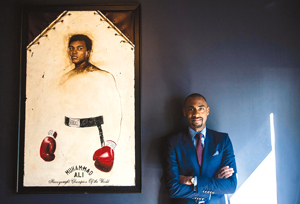
Charles King, 45, rose from the mailroom at William Morris Endeavor to claim his stake as a power agent, ultimately becoming the only African-American partner in the Beverly Hills firm’s 100-plus year history. During his 18-year tenure, King brokered high-profile deals for Oprah Winfrey and Janet Jackson, and shepherded Tyler Perry from struggling playwright to multimillionaire filmmaker and entrepreneur.
But now he’s moving on. This month, King announced that he will leave WME to start Macro, a firm that will focus on financing, developing and distributing films and TV shows for multicultural audiences.
King said backers have provided “eight figures” in funding for the venture, which will be based in Los Angeles. King spoke with the Business Journal at his Studio City home about what to expect from his new endeavor.
Question: What is missing in the entertainment industry that made you see an opportunity to start something new?
Answer: There has never been an African-American head of a studio or a TV channel besides BET. When I first started, there were several studios that didn’t even have one executive of color in their ranks. And if executives don’t understand what’s being sold to them, if the people who are packaging and selling the content don’t have an affinity for it, there’s a gap. The traditional studios and major financing companies don’t have executives from diverse backgrounds, so the capital needed to fund multicultural films is not being provided, and is needed.
How did the idea for Macro come to you?
Being African-American, and someone who wants to make sure content that is being made from Hollywood represents the spectrum of who we are as a society, I noticed the lack of content for diverse groups of people. I love all movies but I have a cultural affinity for multicultural content, so I tried to fill that void. The thing that I’ve been realizing, having success with clients in that space, is that if you really marry access to capital with these artists, you can fulfill a need in the marketplace.
You plan to use crowdfunding for Macro projects.
It won’t be the main driver, but it will be in addition to traditional models.
How will that work?
I’ll give you an example. One of the artists I work for is Justin Simien and he shot a promo for his film “Dear White People.” He posted it online and it took off virally. Then he did an Indiegogo campaign and it raised $41,000 and that got people interested, and then from there we engaged in conversations with several studios and then financiers came in and financed it independently.
How else will the films be financed at Macro?
We will have separate funds for film and television content. There will be a portfolio for independent movies, for Sundance darlings like “Precious.” Then there will be moderately budgeted films in the $15 million range where you co-finance with distributors and other financiers. Then, as we grow, we will be financing on a larger scale, whether it’s comedies that have a target audience that can cross over, or action, like the “Fast and the Furious” films, or dramas like a “Butler” or a “Selma” or a “Ray” that can resonate domestically and globally but can still be in a $20 million-to-$25 million range.
What kind of reaction have you received since announcing your new venture?
I can’t tell you how many phone calls I’ve received from some of the most talented creative artists and producers, asking what can we do together.
Are any of those artists slated for projects yet?
We’re discussing developing something with Ryan Coogler, who made “Fruitvale Station,” and Craig Brewer, who I’ve represented for 10 years at WME, who did “Hustle & Flow.”
Who is on your team?
Ted Sarandos, chief content officer of Netflix, is on the board of advisers and really understands the vision, and also Raymond McGuire, head of global banking at Citigroup, who is someone I have known as a friend.
What does Macro mean?
I named the company Macro because the vision is big. People say if there’s an ethnic theme, they’re segmenting. But they don’t understand how big this multicultural audience is. If you look at popular shows this year like “Black-ish” and “How to Get Away With Murder,” these stories are appealing to broad audiences and have universal appeal. I want to stress that this isn’t niche; it’s mainstream.
